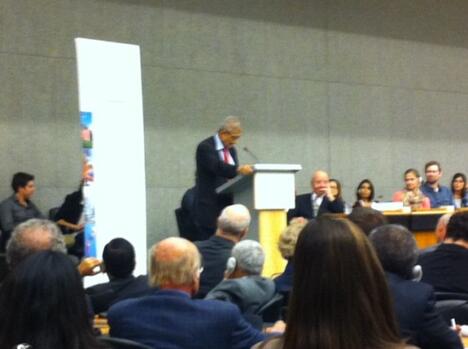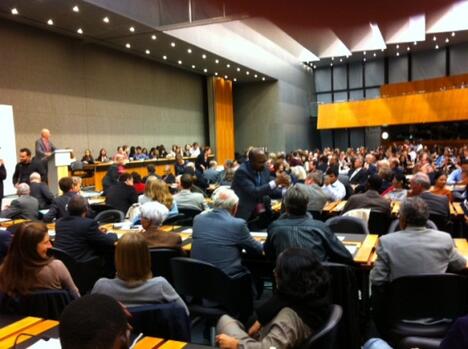Professor Amartya Sen talks in Geneva
| Economics is a "moral and social science" but is subject to widespread scepticism - it is seen as subjective and imprecise. However, when economic analysis is ignored, the social cost can be enormous. A warning from Nobel Laureate, Professor Amartya Sen who addressed around 1000 people including students at the beginning of their academic year at the Graduate Institute in Geneva in a lecture entitled What is the Role of Economics? | |
| An economist is a "doubter" For Sen, the role of an economist is to be the "doubter" in the room. To voice doubts serves a double purpose - it guards us against errors and initiates potentially enriching enquiry. His doubts led him to ask what were the causes of famine in his famous "Poverty and Famine". He is now focusing on what is happening with the euro crisis. Economics is known as the dismal science. However, economics being the "Queen" of social science would have cut no ice with WH Auden who advised new students starting the academic year at Cambridge, "Thou shall not sit with statisticians/Nor commit a social science". Adam Smith and the dual role of markets Perhaps Auden hadn't read Adam Smith, who for Sen, provides the central philosophical perspective on political economy, that markets have a dual purpose - to create wealth and to provide revenue to governments to protect the poor. Smith saw that trade stimulated growth, starting in river and coastal areas which were able to conduct exchange, gain knowledge, specialize and then grow rapidly. Smith was prescient. He warned society against those who (like bankers today) take unrestrained risks to make huge profits and threaten society as a result. Sen wryly commented that Smith didn’t mention state bailouts for these “prodigals and projectors” who created the mess we are in. |
Professor Sen at the podium |
|
Director General of the WTO, Pascal Lamy introduces Professor Sen in the Council Room of the WTO |
|
Euro crisis - no magic bullet Much of Sen's lecture focused on Europe. He praised its noble foundation ideals with political unity needed after war. He reminded us of Auden's words in 1939 "In the nightmare of the dark All the dogs of Europe bark/And the living nations wait/ Each sequestered in its hate" Sen sees some of that hate brewing now. Sen stated that austerity measures in Spain will not work as they are anti-growth. For him, the best option is to combine deficit reduction with economic growth although he did not offer a specific policy to find the money to pay for more stimulus. He was asked what measure he would recommend to Chancellor Merkel if he had five minutes with her. He said that he could not offer a single solution as there is an "asymmetry" between entering the euro (very easy) and leaving it (very difficult, complex and uncertain). Europe therefore has to be "creative" in the solutions it seeks. It may find it in Keynes. In the meantime, Europe should not tell Asian countries to reform as a solution (e.g strengthen China's currency). This lack of certainty about what the solution to the euro crisis left me with a sense of unease. But perhaps having doubts about the solutions currently on offer is a starting point for enquiry. NB: For more on the role of geography and trade stimulating growth, have a look at the new course from Marginal Revolution University- fun fact: Europe has twice the length of coastal areas than Africa - partially explaining its trade-induced growth. Back to the main page of ITC environment blog |





